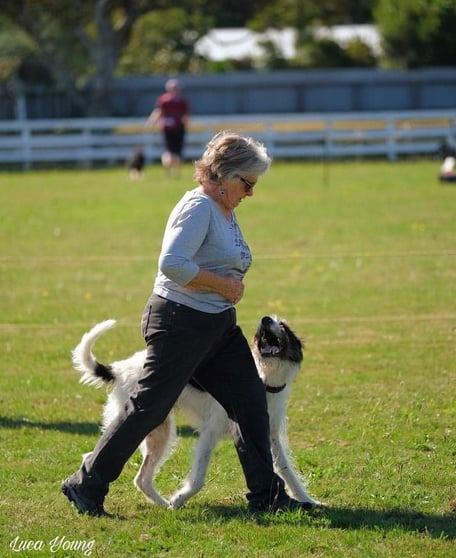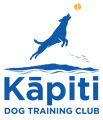Competitive Obedience for Beginners

Obedience as a competitive sport can be compared to the equestrian sport of
dressage, with an emphasis on precision, responsiveness, and versatility. The
extensive range of skills required provides plenty of variety and challenge for both
dog and handler. Dogs perform a series of set exercises, including heelwork, recalls,
retrieving, scent work, stays, and distance work. The difficulty, length, and
complexity of the exercises increases at each of the five levels of competition.
As well as competing for placings, a variety of awards and titles can be earned by
Obedience dogs. This is a Dogs NZ recognised sport.
Modern training methods for Obedience are based on rewards and enjoyment, not
force or coercion. While points are not awarded for style or eagerness, a good
competitive dog should be keen to work, full of confidence, quick and responsive,
and obviously having fun!
This sport requires you to have a firm commitment to training to get the best results.
The dogs love it and the handler learns a great deal about everything to do with dogs which can be very addictive.
When - Thursdays - time to be arranged with instructor between 4pm - 6pm
Pre-requisites: assesment by instructor
Cost: $50
To enrol in this class, dogs must be fully vaccinated.
Click here to go to the Dog Training Registration online enrolment page. (NB Choose the Competitive Obedience class)
What to bring.
- Your dog must have a properly fitted flat collar; approved types are; buckle up or Martingale style collar fitting snug enough to prevent it from slipping back over your dog’s head. Ideally two fingers can be inserted between the collar and the dog’s neck. If you prefer, a well-fitted traditional style harness or Halti can be added as well as an appropriate collar. Slip chain or choke collars are not permitted.
- A 1.2-metre (minimum) light weight leather or nylon / polyester leash is recommended. No chain or retractable leashes are allowed.
- Ensure you always have at least two dog poop bags
- A bum bag / pet training bag or a suitable pocket to allow easy instant access to food treats during training.
- HIGH VALUE training treats. You will need plenty of them so bring more than you think you will need. “Wet” SOFT cubed treats are best for training rewards, use sausage, saveloy, dog roll (e.g. Possyum or Superior Chunky), raw mince, low fat cheese, or cooked chicken. Its best to avoid dry crumbly / crunchy cookie-type treats. We recommend you do not give your puppy any food before they come as the best time to train your dog is before meal times. Hunger aids concentration.
- For dogs who are not food orientated, find a tug toy they get excited about and keep it specifically for training only, and not general play. No squeaky toys please as these distracts other dogs.
- Clicker if you use the clicker training method
What to wear.
For comfort and safety, we recommend closed toe shoes. No jandals, sandals, backless shoes, high heels etc. We train all year-round, warm wet weather gear is needed on winter nights. Feel free to put a dog coat on your dog if you wish, remember that they feel the cold too. Come to class comfortably dressed. Pants are more suitable than skirts.
Registration and vaccination.
Your dog must be currently registered with your local council and microchipped.
Dogs are vaccinated against Canine Distemper, Hepatitis, and Parvovirus. They can also be vaccinated against Kennel Cough and Leptospirosis at your request. Consult your veterinarian re best Vaccination Programme for your dog. Typically your dog would have had two vaccinations before attending. Our grounds are not sterile so it is important that your dog has been vaccinated before attending.
Cancellation Policy.
If you can no longer attend the course for any reason, notification as soon as possible would be most appreciated (email kapitidogtrainingclub@outlook.com). Cancellations received seven days prior to the start of the course will be refunded, less a $10 administration charge. Cancellations received within seven days of the start of the course will be refunded on the same basis only if the place can be refilled, otherwise there will be no refund. The Committee may consider written applications for a full or partial refund at their sole discretion and only in exceptional circumstances
